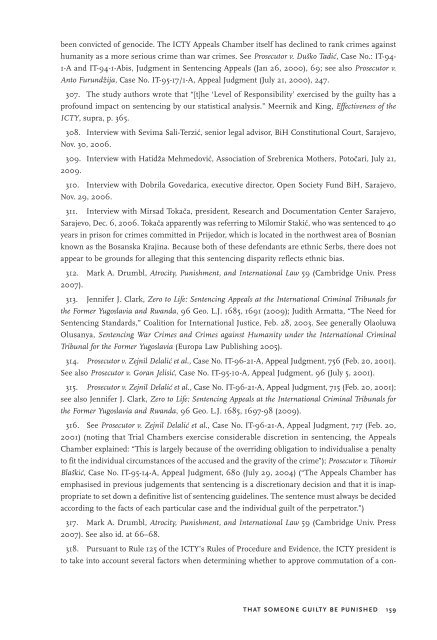That Someone Guilty Be Punished - International Center for ...
That Someone Guilty Be Punished - International Center for ...
That Someone Guilty Be Punished - International Center for ...
Create successful ePaper yourself
Turn your PDF publications into a flip-book with our unique Google optimized e-Paper software.
een convicted of genocide. The ICTY Appeals Chamber itself has declined to rank crimes against<br />
humanity as a more serious crime than war crimes. See Prosecutor v. Duško Tadić, Case No.: IT-94-<br />
1-A and IT-94-1-Abis, Judgment in Sentencing Appeals (Jan 26, 2000), 69; see also Prosecutor v.<br />
Anto Furundžija, Case No. IT-95-17/1-A, Appeal Judgment (July 21, 2000), 247.<br />
307. The study authors wrote that “[t]he ‘Level of Responsibility’ exercised by the guilty has a<br />
profound impact on sentencing by our statistical analysis.” Meernik and King, Effectiveness of the<br />
ICTY, supra, p. 365.<br />
308. Interview with Sevima Sali-Terzić, senior legal advisor, BiH Constitutional Court, Sarajevo,<br />
Nov. 30, 2006.<br />
309. Interview with Hatidža Mehmedović, Association of Srebrenica Mothers, Potočari, July 21,<br />
2009.<br />
310. Interview with Dobrila Govedarica, executive director, Open Society Fund BiH, Sarajevo,<br />
Nov. 29, 2006.<br />
311. Interview with Mirsad Tokača, president, Research and Documentation <strong>Center</strong> Sarajevo,<br />
Sarajevo, Dec. 6, 2006. Tokača apparently was referring to Milomir Stakić, who was sentenced to 40<br />
years in prison <strong>for</strong> crimes committed in Prijedor, which is located in the northwest area of Bosnian<br />
known as the Bosanska Krajina. <strong>Be</strong>cause both of these defendants are ethnic Serbs, there does not<br />
appear to be grounds <strong>for</strong> alleging that this sentencing disparity reflects ethnic bias.<br />
312. Mark A. Drumbl, Atrocity, Punishment, and <strong>International</strong> Law 59 (Cambridge Univ. Press<br />
2007).<br />
313. Jennifer J. Clark, Zero to Life: Sentencing Appeals at the <strong>International</strong> Criminal Tribunals <strong>for</strong><br />
the Former Yugoslavia and Rwanda, 96 Geo. L.J. 1685, 1691 (2009); Judith Armatta, “The Need <strong>for</strong><br />
Sentencing Standards,” Coalition <strong>for</strong> <strong>International</strong> Justice, Feb. 28, 2003. See generally Olaoluwa<br />
Olusanya, Sentencing War Crimes and Crimes against Humanity under the <strong>International</strong> Criminal<br />
Tribunal <strong>for</strong> the Former Yugoslavia (Europa Law Publishing 2005).<br />
314. Prosecutor v. Zejnil Delalić et al., Case No. IT-96-21-A, Appeal Judgment, 756 (Feb. 20, 2001).<br />
See also Prosecutor v. Goran Jelisić, Case No. IT-95-10-A, Appeal Judgment, 96 (July 5, 2001).<br />
315. Prosecutor v. Zejnil Delalić et al., Case No. IT-96-21-A, Appeal Judgment, 715 (Feb. 20, 2001);<br />
see also Jennifer J. Clark, Zero to Life: Sentencing Appeals at the <strong>International</strong> Criminal Tribunals <strong>for</strong><br />
the Former Yugoslavia and Rwanda, 96 Geo. L.J. 1685, 1697-98 (2009).<br />
316. See Prosecutor v. Zejnil Delalić et al., Case No. IT-96-21-A, Appeal Judgment, 717 (Feb. 20,<br />
2001) (noting that Trial Chambers exercise considerable discretion in sentencing, the Appeals<br />
Chamber explained: “This is largely because of the overriding obligation to individualise a penalty<br />
to fit the individual circumstances of the accused and the gravity of the crime”); Prosecutor v. Tihomir<br />
Blaškić, Case No. IT-95-14-A, Appeal Judgment, 680 (July 29, 2004) (“The Appeals Chamber has<br />
emphasised in previous judgements that sentencing is a discretionary decision and that it is inappropriate<br />
to set down a definitive list of sentencing guidelines. The sentence must always be decided<br />
according to the facts of each particular case and the individual guilt of the perpetrator.”)<br />
317. Mark A. Drumbl, Atrocity, Punishment, and <strong>International</strong> Law 59 (Cambridge Univ. Press<br />
2007). See also id. at 66–68.<br />
318. Pursuant to Rule 125 of the ICTY’s Rules of Procedure and Evidence, the ICTY president is<br />
to take into account several factors when determining whether to approve commutation of a con-<br />
THAT SOMEONE GUILTY BE PUNISHED 159

















